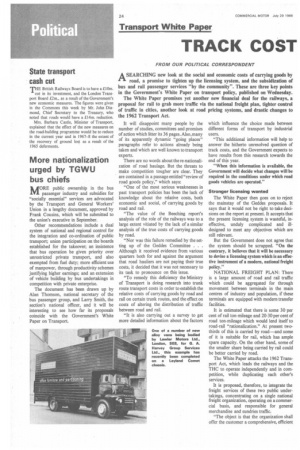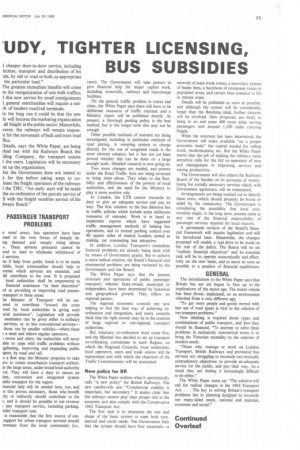TRACK COST 'UDY, TIGHTER LICENSING,
Page 26

Page 27

If you've noticed an error in this article please click here to report it so we can fix it.
ASEARCHING new look at the social and economic costs of carrying goods by road, a promise to tighten up the licensing system, and the subsidization of bus and rail passenger services "by the community". These are three key points in the Government's White Paper on transport policy, published on Wednesday.
The White Paper promises yet another new financial deal for the railways, a proposal for rail to grab more traffic via the national freight plan, tighter control of traffic in cities, another look at road pricing systems, and drastic changes to the 1962 Transport Act.
It will disappoint many people by the number of studies, committees and promises of action which litter its 36 pages. Also, many of its apparently dynamic "going places" paragraphs refer to actions already being taken and which are well known to transport experts.
There are no words about the re-nationalization of road haulage. But the threats to make competition tougher are clear. They are contained in a passage entitled "review of road goods policy," which says:
"One of the most serious weaknesses in past transport policies has been the lack of knowledge about the relative costs, both economic and social, of carrying goods by road and rail.
"The value of the Beeching report's analysis of the role of the railways was to a large extent vitiated by the lack of a similar analysis of the true costs of carrying goods by road.
"Nor was this failure remedied by the setting up of the Geddes Committee . Although it received evidence from various quarters both for and against the argument that road hauliers are not paying their true costs, it decided that it was not necessary to its task to pronounce on this issue.
"To remedy this deficiency the Ministry of Transport is doing research into trunk route transport costs in order to establish the relative costs of carrying goods by road and rag on certain trunk routes, and the effect on costs of altering the distribution of traffic between road and rail.
"It is also carrying out a survey to get more detailed information about the factors which influence the choice made between different forms of transport by industrial users.
"This additional information will help to answer the hitherto unresolved question of track costs, and the Government expects to have results from this research towards the end of this year.
"When this information is available, the Government will decide what changes will be required in the conditions under which road goods vehicles are operated."
Stronger licensing wanted
The White Paper then goes on to reject the mainstay of the Geddes proposals. It says that it would not be right to take decisions on the report at present. It accepts that the present licensing system is wasteful, ineffective, unduly complicated and illdesigned to meet any objectives which are still relevant.
But the Government does not agree that the system should be scrapped. "On the contrary, it believes that it will be necessary to devise a licensing system which is an effective instrument of a modern, national freight policy."
NATIONAL FREIGHT PLAN: There is a large amount of road and rail traffic which could be aggregated for through movement between terminals in the main centres of industry and population, if these terminals are equipped with modern transfer facilities.
It is estimated that there is some 30 per cent of rail ton-mileage and 20-30 per cent of road ton-mileage which would lend itself to road-rail "rationalization." At present twothirds of this is carried by road—and some of it is suitable for rail, which has ample spare capacity. On the other hand, some of the smaller share being carried by rail could be better carried by road.
The White Paper attacks the 1962 Transport Act, which leads the railways and the THC to operate independently and in competition, while duplicating each other's services.
It is proposed, therefore, to integrate the freight services of these two public undertakings, concentrating on a single national freight organization, operating on a commercial basis, and responsible for general merchandise and sundries traffic.
"The object is that the organization shall offer the customer a comprehensive, efficient I cheaper door-to-door service, including lection, transport and distribution of his xis, by rail or road or both, as appropriate the particular load."
The greatest immediate benefits will come
m the reorganization of non-bulk traffics, I this new service for small consignments 1 general merchandise will require a netrk of modern road/rail terminals.
En the long run it could be that the new Iy will become the marketing organization all freight in the public sector. Meanwhile, wever, the railways will remain respon!e for the movement of bulk and train-load ffics.
Details, says the White Paper, are being rked out with the Railways Board, the lding Company, the transport unions I the users. Legislation will be necessary ;et up the organization.
3ut the Government does not intend to it for this before taking steps to coMate the freight operation of the railways I the THC. "An early start will be made the co-ordination of the parcels service of S with the freight sundries service of the ilways Board."
PASSENGER TRANSPORT PROBLEMS n rural areas, bus operators have been osed to the twin forces of sharply deing demand and steeply rising labour s. These adverse pressures cannot be wed to lead to wholesale withdrawal of 1 services.
;tit if help from public funds is to be made lable, local communities should help to rmine which services are essential, and ild contribute to the cost. It is proposed local authorities shall be empowered to financial assistance "at their discretion" xl at providing or improving road passentransport in these areas.
he Minister of Transport will be emered to contribute "toward the costs rred by local authorities in giving such icial assistance". Legislation will provide assistance can be given either to ordinary services, or to less conventional services— those run by smaller vehicles—where these t a need and relieve regular operators.
towns and cities, the authorities will never able to cope with traffic problems without igthening, improving and expanding public sport, by road and rail.
.s a first step, the Minister proposes to take ers to create conurbation transport authoriin the large areas, under broad local authority rol. They will have a duty to secure an ient, convenient and integrated system ublic transport for the region.
inancial help will be needed here, too, and -e this proves necessary, those who benefit :tly or indirectly should contribute to the s, and it should be possible to use revenue any transport service, including parking, vider transport uses.
is reasonable that the first source of outsupport for urban transport services should -evenues from the local community (i.e.,
































































































































































